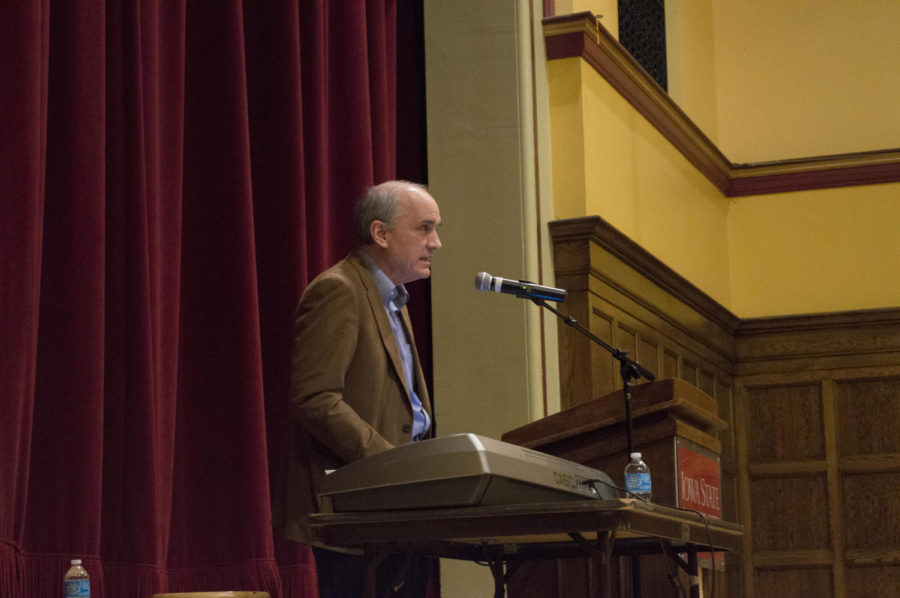Activist Dan Barker talks about freedom from religion
Charlie Coffey/Iowa State Daily
Dan Barker, co-president of the Freedom From Religion Foundation, shares some of the songs he has written during his lecture on the separation of church and state on Oct. 16 in the Great Hall.
October 20, 2014
Dan Barker believes religion should be separate from government.
Barker, one of the co-presidents and founder of the Freedom From Religion Foundation, visited the ISU free speech zone on Oct. 17 to talk to students about the separation between church and state.
Barker was a former evangelical preacher who is now an atheist activist. He tells his story from faith to atheism in his book “Godless.”
“You can’t sell to skeptics something that we don’t think that we need,” Barker said during his speech at the Memorial Union on Oct. 16. “You have to convince us that we need it in the first place.”
The Freedom From Religion Foundation receives complaints about a potential mixing of church and state and writes letters to schools and other organizations, fighting for the constitutional right.
“It’s an honor to be called a blasphemer,” Barker said. “We live in a country where we have freedom of speech, and freedom of religion.”
Barker said the Freedom From Religion Foundation receives complaints and threats everyday, which the police have asked that they report.
One of the Freedom From Religion Foundation’s recent ISU endeavors was removing the bibles from the Memorial Union hotel rooms, an act that resulted in reactions of both support and hate.
“People are welcome to [believe in religion.] Our group is not trying to stop anyone from believing [in their religion,]” Barker said. “The only time that the FFRF complains is when the government gets involved.”
The First Amendment in the Constitution states the government is to be separate from the church or to be neutral toward religion. The document doesn’t say the phrase, “separation of church from state” directly, but says: “Congress shall make no law respecting an establishment of religion, or prohibiting the free exercise thereof…”
Barker said the aim of the Freedom From Religion Foundation is not to impose on people’s religious standpoints but to protect religious freedom.
“Why should there only be one viewpoint in my [hotel] room? There should be all or none,” Barker said about removing the bibles from the Memorial Union hotel rooms.
The bibles are still available upon request to guests at the hotel desk in the Memorial Union.
“Since I’m going into law, it’s been helpful for me to be informed of issues currently going through the legal system,” said Christjahn Beck, senior in political science and the president of the Atheist and Agnostic Society. “I also thought it was interesting how he opened with the reasons for the separation between church and state and how it actually serves to protect the religious freedoms of everyone, as opposed to imposing on them.”
Other members at the Atheist and Agnostic Society booth said they are looking forward to the other speakers who will be coming to speak to the AAS, including Robert Cargill, University of Iowa associate professor of Biblical studies, who will speak on the Dead Sea Scrolls. He is set to speak for the AAS at 7.p.m. on Oct. 23 in the Sun Room in the Memorial Union.
Students can read Freedom From Religion Foundation’s newspaper, Freethought Today, to stay informed on cases involving the separation between church and state, as well as to write to the foundation with questions.
“We’re fighting for neutrality,” Barker said. “The government is neither for nor against religion.”

















